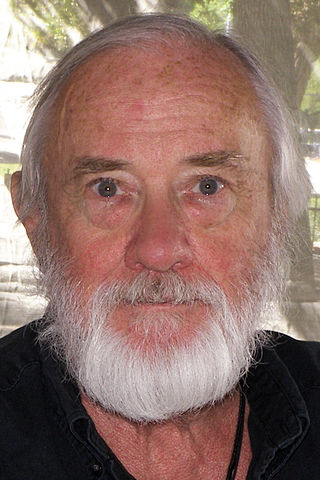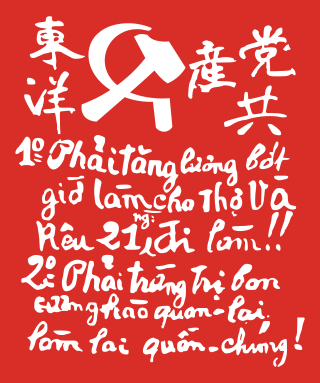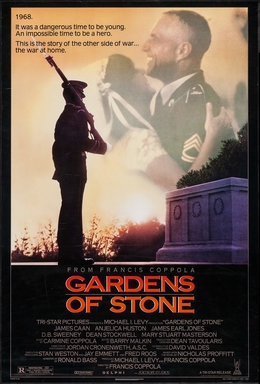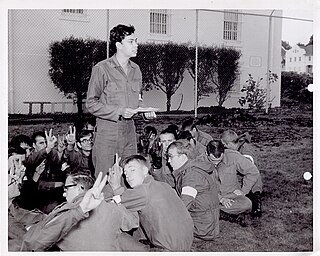November 11 is the 315th day of the year in the Gregorian calendar; 50 days remain until the end of the year.

The Vietnam War was a conflict in Vietnam, Laos, and Cambodia from 1 November 1955 to the fall of Saigon on 30 April 1975. It was the second of the Indochina Wars and a major conflict of the Cold War. While the war was officially fought between North Vietnam and South Vietnam, the north was supported by the Soviet Union, China, and other countries in the Eastern Bloc, while the south was supported by the US and anti-communist allies. This made it a proxy war between the US and Soviet Union. It lasted almost 20 years, with direct US military involvement ending in 1973. The conflict spilled into the Laotian and Cambodian civil wars, which ended with all three countries becoming communist in 1975.

War film is a film genre concerned with warfare, typically about naval, air, or land battles, with combat scenes central to the drama. It has been strongly associated with the 20th century. The fateful nature of battle scenes means that war films often end with them. Themes explored include combat, survival and escape, camaraderie between soldiers, sacrifice, the futility and inhumanity of battle, the effects of war on society, and the moral and human issues raised by war. War films are often categorized by their milieu, such as the Korean War; the most popular subjects are the Second World War and the American Civil War. The stories told may be fiction, historical drama, or biographical. Critics have noted similarities between the Western and the war film.

A Tomb of the Unknown Soldier or Tomb of the Unknown Warrior is a monument dedicated to the services of an unknown soldier and to the common memories of all soldiers killed in war. Such tombs are located in many nations and are usually high-profile national monuments. Throughout history, many soldiers have died in war with their remains being unidentified. Following World War I, a movement arose to commemorate these soldiers with a single tomb, containing the body of one such unidentified soldier.

Platoon is a 1986 American war film written and directed by Oliver Stone, starring Tom Berenger, Willem Dafoe, Charlie Sheen, Keith David, Kevin Dillon, John C. McGinley, Forest Whitaker, and Johnny Depp. It is the first film of a trilogy of Vietnam War films directed by Stone, followed by Born on the Fourth of July (1989) and Heaven & Earth (1993). The film, based on Stone's experience from the war, follows a new U.S. Army volunteer (Sheen) serving in Vietnam while his Platoon Sergeant and his Squad Leader argue over the morality in the platoon and of the war itself.

The First Indochina War was fought between France and Việt Minh, and their respective allies, from 19 December 1946 until 20 July 1954. Việt Minh was led by Võ Nguyên Giáp and Hồ Chí Minh. Most of the fighting took place in Tonkin in Northern Vietnam, although the conflict engulfed the entire country and also extended into the neighboring French Indochina protectorates of Laos and Cambodia.

Flower power was a slogan used during the late 1960s and early 1970s as a symbol of passive resistance and nonviolence. It is rooted in the opposition movement to the Vietnam War. The expression was coined by the American Beat poet Allen Ginsberg in 1965 as a means to transform war protests into peaceful affirmative spectacles. Hippies embraced the symbolism by dressing in clothing with embroidered flowers and vibrant colors, wearing flowers in their hair, and distributing flowers to the public, becoming known as flower children. The term later became generalized as a modern reference to the hippie movement and the so-called counterculture of drugs, psychedelic music, psychedelic art and social permissiveness.

Robert Anthony Stone was an American novelist, journalist, and college professor.

Missing in Action is a 1984 American action film directed by Joseph Zito and starring Chuck Norris. It is set in the context of the Vietnam War POW/MIA issue. Colonel Braddock, who escaped a Vietnamese prisoner of war camp ten years earlier, returns to Vietnam to find American soldiers listed as missing in action during the Vietnam War. The film was followed by a prequel, Missing in Action 2: The Beginning (1985), and a sequel, Braddock: Missing in Action III (1988). The first two Missing in Action installments had been filmed back-to-back with the intent to have the first film involve the POW years of Braddock be the first film. However, it was determined that the commercial prospects were stronger with the film directed by Zito involving the POW rescue. As such, Hool's film was turned into Missing in Action 2 and labeled as a prequel that detailed events before those in Missing in Action.

Vietnam Veterans Against the War (VVAW) is an American tax-exempt non-profit organization and corporation founded in 1967 to oppose the United States policy and participation in the Vietnam War. VVAW is a national veterans' organization that campaigns for peace, justice, and the rights of all United States military veterans. It publishes a twice-yearly newsletter, The Veteran; this was earlier published more frequently as 1st Casualty (1971–1972) and then as Winter Soldier (1973–1975).

The Indochinese Communist Party (ICP) was a political party which was transformed from the old Vietnamese Communist Party in October 1930. This party dissolved itself on 11 November 1945.
Gerald Dwight "Wings" Hauser is an American actor, screenwriter, film director, and musician. A prolific character actor, he has appeared in over 100 film and television productions since 1967, and was once called "the biggest star you've never heard of."

Gardens of Stone is a 1987 American drama film directed by Francis Ford Coppola, based on a novel of the same name by Nicholas Proffitt. It stars James Caan, Anjelica Huston, James Earl Jones, D. B. Sweeney, Dean Stockwell and Mary Stuart Masterson.

The lizard pattern is a family of many related designs of military camouflage pattern, first used by the French Army on uniforms from 1947 to the late 1980s. It was based on the British paratroopers' Denison smock. The use of the pattern is widespread in Africa, despite its association with France, because armed factions and militaries tend to obtain them from whichever source has it available.

The Presidio mutiny was a sit-down protest carried out by 27 prisoners at the Presidio stockade in San Francisco, California on October 14, 1968. It was one of the earliest instances of significant internal military resistance to the Vietnam War. The stiff sentences given out at courts martial for the participants drew international attention to the extent of sentiment against the war within the U.S. military, and the mutiny became "[p]erhaps the single best known event of the domestic GI movement".

The following events occurred in April 1975:

Fernando Gomes de Morais is a Brazilian journalist, biographer, politician and writer. He wrote biographies and books on a series of Brazilian historical personalities and events, many of which were adapted into film.
When the Tenth Month Comes is the first Vietnamese film to be shown in the West after the Vietnam war. The film primarily centers around the misery of a young woman whose husband has died in the war. Despite the peaceful rural setting, the film is shot in black and white illustrating the oppressive and suffocating atmosphere of war. The theme of sadness and the inevitability of death dominates the film, uncovering a painful daily reality - a living imprint of Vietnam's history on the common people.

Rape, among other acts of wartime sexual violence, was frequently committed against female Vietnamese civilians during the Vietnam War. It was an aspect of the various human rights abuses perpetrated by the United States and South Korea, as well as by local Vietnamese combatants. According to American political scientist Elisabeth Jean Wood, the sexual violation of women by American military personnel was tolerated by their commanders. American professor Gina Marie Weaver stated that not only were documented crimes against Vietnamese women by American soldiers ignored during the international legal discourse that occurred immediately after the conflict, but modern feminists and other anti-war rape campaigners, as well as historians, have continued to dismiss them.
















